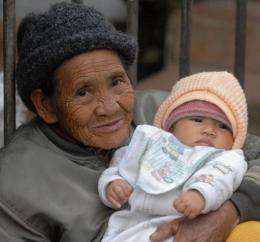Scientists shed light on sleep through the ages

What starts with an "s" that seniors need more of than younger adults, is great to get a bit of in the middle of the day and could cause teens to turn to drugs if they don't get enough of it?
The answer is sleep, according to several studies presented at the annual meeting of the American Association for the Advancement of Science.
A study conducted by researchers at the University of California San Diego (UCSD) found that 68-year-old adults, on average, did better on a simple memory test if they got more sleep.
In younger adults, aged 27 years on average, the quality of sleep also affected how they performed on the same test.
"What mattered in the younger adults was sleep efficiency -- that the sleep was consolidated into one solid chunk," said Sean Drummond, a professor at UCSD's department of psychiatry who led the study, adding that sleeping soundly and uninterruptedly happens less and less frequently with age.
"The most common change in sleep as we age is you wake up in the middle of the night and you're awake for some time, meaning you have lower sleep efficiency," Drummond said.
"In the older adults what we found is that waking up in the middle of the night did not affect brain function or performance the next day but if a young adult did that, it had significant detrimental effects on brain function," he said.
Another study looked at the possible benefits of napping.
"Our question first was could you get the same benefits from a short daytime nap as a full night of sleep," said Sara Mednick, also from UCSD's department of psychiatry.
"We started looking over a number of different tests beginning with a visual learning test, which showed that if you had a 90 minute nap you showed the same level of benefit as a full night of sleep," Mednick said.
"There's something very special about naps," she said.
But not everyone has the luxury of being able to catch a few Zs in the middle of the day, and as a substitute, many seek a caffeine boost.
But a double espresso works less well than a 20-minute nap, said Mednick.
"On some tasks, such as those involving perceptual memory, caffeine works as well as a nap," said Mednick.
"But when the task involves the hippocampus, the area of the brain devoted to explicit memories you can manipulate consciously, such as learning a list of words or a phone number or name, with caffeine, your memory for those kinds of tasks is decreased," she said.
Meanwhile, another study found that "two significant clinical and public health problems, sleep disorders and drug use in teens" are closely inter-twined.
Not only are teens who sleep less than seven hours a day more likely to do drugs, but they are also likely to pass both their bad sleep and drug-use behavior to friends and siblings. Related article: Study links lack of sleep to drug use among teens
"An adolescent who does not get enough sleep can influence a friend's sleep behavior, which increases the risk that the friend will use drugs," the study says.
Researchers at UCSD and Harvard University found that teens with a friend who sleeps less than seven hours a night are 11 percent more likely to sleep less than seven hours themselves and 19 percent more likely to use marijuana than teens whose friends get a good night's kip.
The US National Sleep Foundation recommends that teens get at least 8.5 hours of sleep and that adults, both younger and older, get at least seven hours.
The study was the first to find that poor sleep habits and drug use spread through teenagers' social networks "like a contagion," extending to up to four degrees of separation -- or to friends of friends of friends of friends.
(c) 2010 AFP















